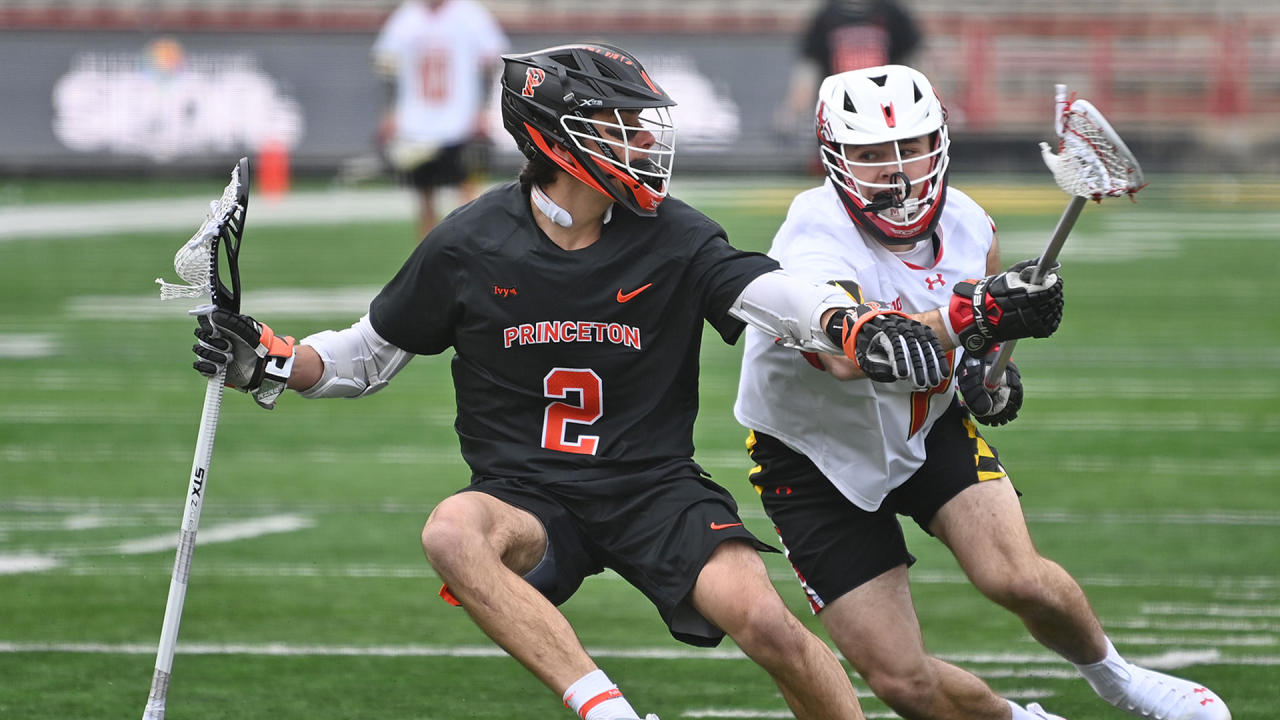
Is the Future Now — or Later — for Princeton?
COLLEGE PARK, Md. — Princeton’s future — perhaps a few weeks down the road, maybe a couple months, possibly even further — was plainly visible Saturday.
Wicked, long-range shots freshman attackman Nate Kabiri deposited with apparent ease. A defense with plenty of new faces in bigger roles held up admirably despite logging plenty of time. Goalie Michael Gianforcaro matched a career high with 20 saves.
And there were reminders the future isn’t quite here yet.
The Tigers’ 13-7 loss at Maryland was a distillation of those two ever-dangerous words: Talent and (especially) potential. And were it not for the Terrapins’ Luke Wierman winning 20 of 23 faceoffs to massively tilt the field toward Maryland, talent and potential would have come a bit closer to scoring Princeton an impressive victory in its first serious test.
“I think we’ve got dudes all over the field,” senior long-stick midfielder Pace Billings said. “I think we have potential all over the field. We hope to capitalize on that, and I think we will.”
The question for the Tigers (2-1) moving forward is how soon will it happen?
The schedule dictates they can’t wait long. Saturday marked the start of a 29-day period that also includes trips to North Carolina, Duke and Rutgers before Cornell visits for the Ivy League opener. Oh, and then Princeton heads to Harvard to close the six-game stretch.
Yet the evidence suggests they won’t have to. Kabiri scored four times, becoming the first player in Princeton history to score three goals in each of his first three games. The Kabiri-Coulter Mackesy pairing on attack is going to make plenty of defensive coordinators miserable this season.
That, in tandem with one of Division I’s best goalies, a versatile veteran presence in Billings and a budding star in sophomore defenseman Cooper Kistler, should provide balance, so long as Princeton has the ball enough.
Which it clearly didn’t Saturday.
“The possessions were a major theme,” said coach Matt Madalon, whose team opened with victories over Monmouth and Manhattan. “They just make you pay for every little mistake. Obviously, a great program. We’re still figuring ourselves out a little bit, but we obviously hoped we would have come out and performed a little bit better.”
I think we have potential all over the field. We hope to capitalize on that, and I think we will.
Princeton LSM Pace Billings
Eric Spanos scored four goals for Maryland (4-0), including a pair in the first quarter to stake the Terps to a 3-0 advantage. Their lead never shrunk to less than two the rest of the way.
“I think if any guy on the team scores those two quick goals, I think it’s something we can build off of,” Spanos said.
Saturday’s proceedings followed what’s become a typical script for Maryland-Princeton games in recent years. Early in the 2022 season, Princeton provided the Terps’ juggernaut one of its peskier tests in a 15-10 game. But Maryland still led 4-1, never trailed and didn’t let the Tigers get closer than three in the second half.
In the NCAA semifinals a few months later, Maryland was up 5-1 after a quarter in a 13-8 victory. And last year in New Jersey, the Terps also built a 5-1 lead in what became an 11-5 triumph.
This time, Maryland bolted to a 6-1 advantage, and Princeton never got closer than four the rest of the way. Credit Wierman for making this less stressful than it could have been for the Terps, who were coming off a draining overtime victory at Syracuse last week. Maryland coach John Tillman knows all about the advantages a veteran team provides early in the season, as well as the learning curve a skilled-but-inexperienced team can navigate deftly if things break right.
And things could well break right for Princeton.
“That attack gives you fits. They do such a good job,” Tillman said. “You have a goalie you can rely on, you have a defense that’s athletic. I like their short sticks. They’re not going to give up many goals. … I think that team is going to be good by the time the end of the year comes. Those guys will keep coaching them up.”
Saturday capped a stretch of three games in seven days for Princeton, which is breaking in so many younger players in part because an impressive senior class eligible for a bonus year thanks to the NCAA’s blanket COVID waiver departed after last season for other destinations because of Ivy League regulations preventing graduate students from competing.
Fair or not, it’s tempting to wonder how a team still developing its midfield would fare with Sam English (Syracuse), Christian Ronda (Michigan), Jake Stevens (Syracuse) or Alexander Vardaro (Georgetown) in the mix. Or, for that matter, an elite short stick defender like Beau Pederson (Michigan).
But the hand Princeton can play is still intriguing, and it figures to grow stronger in time.
“Three games in a week is a lot, but it’s been a good experience so far,” Kabiri said. “We’re a pretty young offense, so this is a lot of people’s first time out here. We’re learning a lot about ourselves and continue to get better.”
The list of teams that could improve more than Princeton between now and May is short, and perhaps even nonexistent.
Could offers no guarantees, of course. But you don’t have to look hard to see what might be — possibly really soon.
“We’re young and we have a bunch of guys who haven’t played a lot of minutes, and that’s awesome,” Billings said. “They’re definitely going to step up, and they’ve already stepped up. You saw a lot of young guys play well and step up to the occasion. We’re just getting better, and we’re just learning. It might be a slow build, but that’s the beauty of this game.”
Patrick Stevens
Patrick Stevens has covered college sports for 25 years. His work also appears in The Washington Post, Blue Ribbon College Basketball Yearbook and other outlets. He's provided coverage of Division I men's lacrosse to USA Lacrosse Magazine since 2010.

Related Articles





